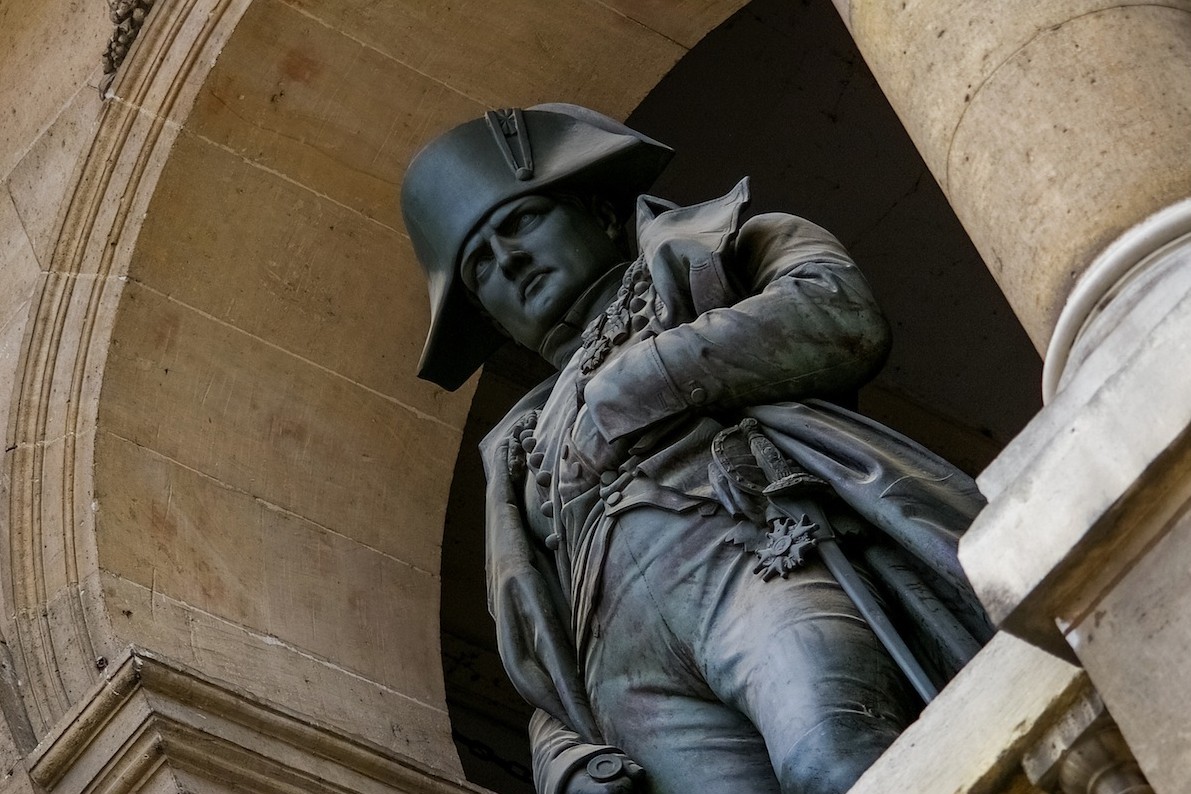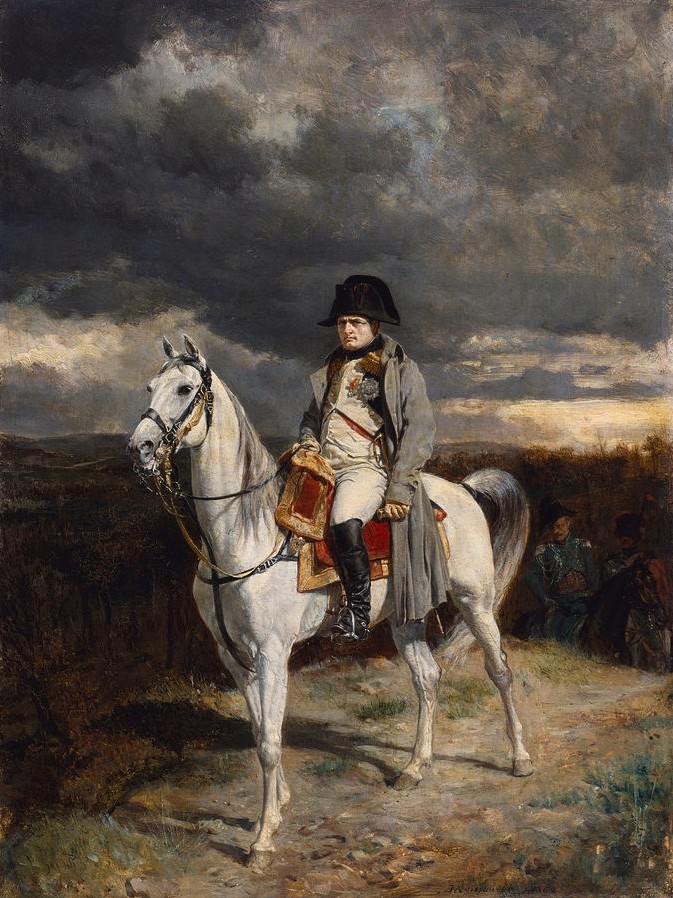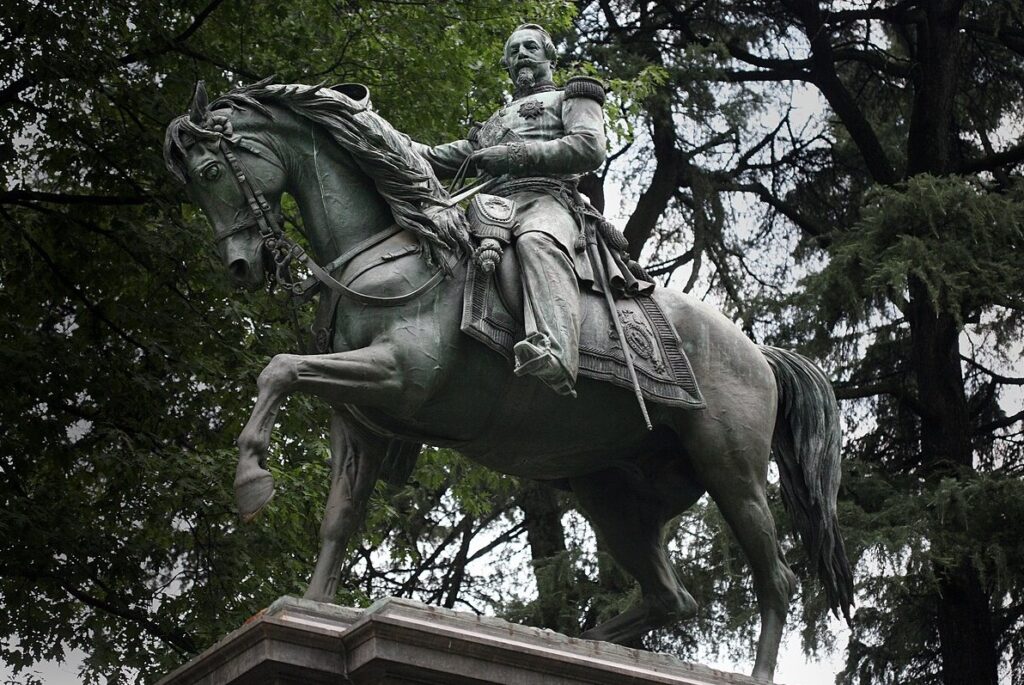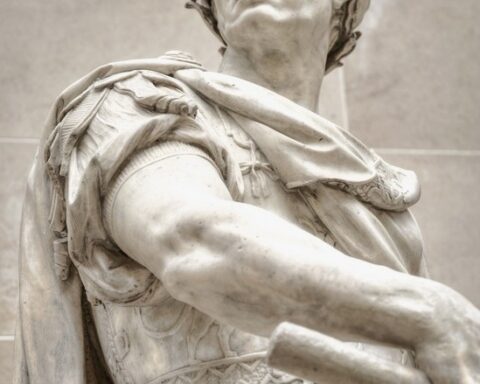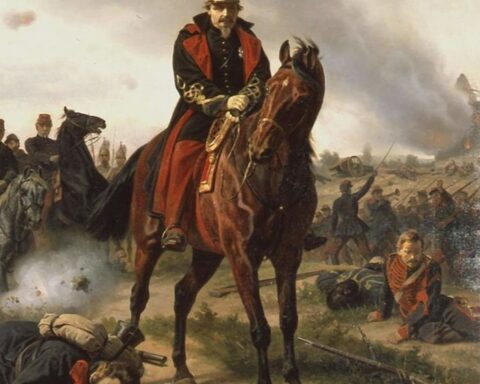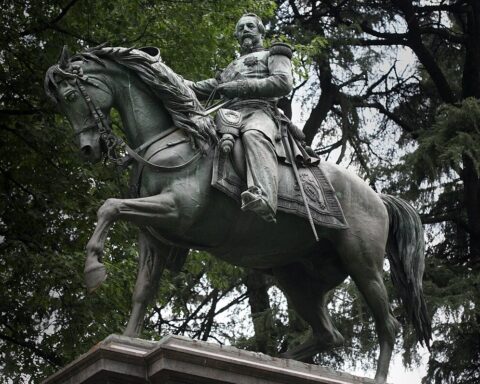Editor’s note: This is the fourth of six lectures given by H.A.L. Fisher at the University of London in June, 1907. They were published in book form under the title, Bonapartism (London, Oxford at the Clarendon Press, 1908).
(Continued from Part 3)
The Bourbon dynasty who were recalled to France in 1814 owed this sudden favour of fortune to no merit of their own. Their party was almost extinct, their persons dim and forgotten, and as the Tsar of Russia marched through the eastern provinces of France he discovered no trace of loyalty to the white flag. Twenty-five years crowded with brilliant events and far-reaching changes had passed since Louis, Count of Provence, and his brother D’Artois had fled across the frontier to escape the furies of the Revolution; and in the new and vivid life of the Empire all that concerned the old world of the monarchy had seemed archaic, irrelevant, and trifling. But France was weary of battle, and unwilling to embark upon an unknown ocean of political experiment. It was no hour for a constituent assembly, with Russians and Austrians encamped in Paris, and so long as Napoleon was alive and near at hand an imperial regency failed to offer gurantees of stability and peace. It was necessary, as Talleyrand observed, that the new régime should be founded on a principle, and the Bourbons relied on the principle of legitimacy. Their restoration under adequate conditions would be a solemn pledge given to Europe that France was tired of adventure and would keep the peace. It was hoped that in a constitutional charter that troubled nation would at length be composed to rest.
The psychological current in European literature was setting strongly towards romance. The Middle Ages, which Voltaire could never understand because their superstition revolted his clear intelligence, began to exercise a fascination now that the practical evils of mediaevalism were satisfactorily abolished. Chateaubriand, the leader of the French Romantic Movement, portrayed in brilliant colours the aesthetic charms of the Christian cult, and startled the intelligence of well-bred ladies and gentlemen by the observation that the heroes and heroines of Racine were the products of Christian sentiment. The splendours of Church architecture, the beauty of Church music, the ordered charm of Christian ritual, and the simple majesty of Christian literature, such was the theme of his eloquent essay, so contemptible to the profound apologist, but so effective with a generation of romantic and intelligent infidels. The same pen addressed itself to commending the exiled dynasty which was now restored to France by foreign bayonets. To the romance of the triumphant Empire the greatest living artist in the French language opposed the pathos of exile, a romance of bread eaten in sorrow by men who loved France and of whose devotion France has proved herself unworthy.
Sentiment failed to cluster round the fabric of the new dynasty. Louis XVIII was old, corpulent, and gouty, incapable of bestriding a horse, and destitute of any power of appeal to the soul of his people. His brother and heir, the Count of Artois, was a narrow-minded bigot, whose sinister influence gave matter for bitter suspicions. The dynasty had been put upon the French throne by foreign armies. Its success was connected with contracted frontiers and national humiliation, and its conduct gave good ground for thinking that it viewed the charter with dislike and would at some near date restore the émigrés to their land and the Church to its old position of endowed and intolerant predominance. With astonishing speed discontent spread through the country. In every village half-pay officers might be found, grumbling at the reduction of a great army to a peace establishment and at the restoration of the exiles to their former military rank. Was it true that these inglorious men who cheapened the Legion of Honour, who closed the shops on Sunday, were intending to bring back the old régime, to steal the land from the peasant, and to restore the noble and the priest? A violent current of suspicion ran through France that such indeed was their design.
From his exile in Elba Napoleon had taken note of the new features on the horizon, of the recrudescence of the revolutionary hatred of priest and noble among the peasantry, of the chagrin of the old soldiers, of the power of the Liberal opposition in Paris; and recognizing the altered mood of France, he determined to accommodate himself to it. In his miraculous progress from Fréjus to Paris he spoke everywhere as the Tribune of the people, as the champion of the revolution settlement, as a professor of Liberalism and peace. At Lyons he dissolved the Chamber of Peers, banished the émigrés, proscribed the royal flag and the white cockade. ‘I come to deliver France from the emigrants. I am sprung from the Revolution. I am come to save the people from the slavery into which the priests and the nobles would plunge them. Let them beware, or I will string them up on the lantern.’ Entering Paris on March 20, 1815, he said to Molé that he found the hatred of the priests and the nobility as violent and as universal as it was at the beginning of the Revolution. Yet however strong the Revolutionary forces might have been, his tradition, instinct, and political tact taught him that he must not rest upon the support of the mob. On the other hand, the public opinion of the capital forbade a return to absolutism. Every minister, every official, told Napoleon the same tale; that there must be guarantees for civil liberty, that the representatives of the nation must vote the taxes and the laws, that the ministers must be responsible to popular control, and that the Press must be free. The Bourbons had alienated the intellectual class because it was suspected that they intended to overthrow the charter, and France wished that the charter should be fairly tried. Napoleon bowed to the force of opinion, and after permitting the question of constitutional reform to be debated in a committee, summoned Benjamin Constant, the leader of the opposition to the Bourbons, and charged him with the duty of drawing up the charter of the liberal empire. ‘The nation,’ he observed, ‘wishes, or believes that it wishes, a tribune and assemblies. The government of the Bourbons, being feeble and antagonistic to the national interests, has accustomed these interests to defend themselves and to contest authority. The taste for political debates appears to have returned.’
Constant was a brilliant publicist, and had educated the political world of Paris in the theory and practice of constitutional government. No one had been a more formidable opponent of the Bourbons, no one had attacked the despotism of the Empire with more point and force than this mercurial politician, half dreamer, half viveur, who had served his rhetorical apprenticeship in the short-lived tribunate. The capture of Constant was the first overt token of the alliance between the forces of Bonapartism and Liberalism which was destined to exert so powerful an influence on the history of Europe. His constitution was not a revolutionary document, for it made place for an hereditary peerage, and on Napoleon’s demand was christened l’acte additionnel aux constitutions de l’empire. But it was a liberal document. It broadened the electorate, freed the Press, dethroned the Roman Catholic Church from its position as a state religion, and secured the permanent control of the executive by the legislature. In the preamble, the history of the Empire was thrown into a new perspective and accommodated to the startling revolution in policy which the new mood of France had forced upon Napoleon. It was represented that the work of the Empire had been addressed to the formation of a European federation into which it was proposed to introduce liberal principles. Unfortunately the continuance of war had rendered it necessary to adjourn the blessings of liberty, and the blindness of the monarchs and aristocrats of Europe resulted in the destruction of this great civilizing project. What had been done could not now be undone. The federation was a thing of the past and could not be reconstituted without a European war, which it did not belong to the intention of the Emperor to provoke. It was necessary, then, to acquiesce in the settlement which the overwhelming power of the coalition had imposed on France. Henceforth the Empire would stand for peace. On a smaller scale, but with undiminished and undeviating zeal, the Emperor would carry out those liberal projects from which the obstinate rage of English Tories had necessarily diverted him. His name should stand for the ideas of 1789, for peace and liberal institutions.
On June 18, 1815, towards midday, Chateaubriand strolled out of the ancient town of Gand by the Brussels gate, a copy of Caesar’s Commentaries in his hands. He had left his sovereign, a crumpled, dejected, inglorious old gentleman, quietly awaiting in some obscure lodging the issue of the campaign which was to decide the fortunes of his house. The sky was overcast, and still as with the premonition of advancing storms. Suddenly a sound was heard. The wanderer stopped, hesitated whether to go forward or return, then waited to listen again. The cry of a moorhen in the reeds broke the silence; then a bell sounded from a neighbouring church. He stepped forward, but had hardly advanced thirty paces when the rolling sound began again, now sharp and brief, now drawn out at unequal intervals. It was a roar of battle, not of thunder. ‘I crossed the road,’ he writes, ‘and leant against a poplar at the corner of a field of barley, my face turned towards Brussels. A southerly wind brought the noise of artillery nearer to me. This great battle, still unnamed, whose echo I heard at the foot of a poplar, whose unknown funerals a village bell had sounded, was the battle of Waterloo.’ Chateaubriand depicts in his memoirs the stream of emotions which passed through his being as he listened to the faint report of that tremendous tragedy. If the English won, his master would be restored to power; if they lost, he would be compelled to return to exile. ‘Was it,’ he asks, ‘a new Crecy, a new Poictiers, a new Agincourt, which the most implacable enemies of France were about to enjoy? If they triumphed, was not our glory lost? If Napoleon won, what became of our liberty? Though Napoleon’s success meant lifelong exile to me, the thought of my country filled my heart. My prayers were for the oppressor of France, that he might save our honour and rescue us from the dominion of the foreigner.’
There is no force in history more powerful than sentiment, and the defeat of Waterloo strengthened rather than weakened the sentiment of France for Napoleon. It might have been supposed that the cause of French imperialism was finally shattered by the wanton temerity and reckless egoism which had involved France in this hideous sacrifice. For a second time the country was given to understand that allegiance to Napoleon brought in its train foreign invasion and the loss of frontiers; and if chastisement can ever cure a people of political infatuation France should assuredly have been cured of her infatuation for Napoleon. It seemed as if the story were now finally wound up. Napoleon himself was far away in a lonely island in the Atlantic, his infant son was under Austrian tutelage, his elder brother an exile, his wife the paramour of an Austrian general, and the other members of his family under close police supervision. There was reason enough to suppose that Bonapartism was dead. So shrewd a judge as Metternich believed that Bonapartism was impossible without Bonaparte.
Napoleon judged otherwise. From his distant rock in the Atlantic he surveyed the course of European politics, and reckoned that a time would come when France, weary of unintelligent despotism, would revert to the principles upon which his government had been founded. ‘The Battle of Waterloo,’ he said, ‘has been as fatal to the liberties of Europe as the battle of Philippi was fatal to those of Rome’; and during the period of Metternich’s influence there was sufficient truth in the proposition to nourish his hopes and to inspire his energies. He applied himself to the task of accommodating the history of his own career to the political tendencies which he judged to have a future before them. In this way he would serve the interests of the future head of his house.
The story of the St. Helena captivity has been generally treated as an episode of little historical but of much personal interest, and a library has collected around the relations of Napoleon and that honourable, pedantic, and unfortunate man, Sir Hudson Lowe. This is not the point of view from which to approach one of the important passages in European history. Napoleon at St. Helena possessed a rare opportunity, of which he took full advantage, of presenting himself in a favourable and pathetic light to the consideration of France and of Europe. ‘Our situation here may even have its attractions,’ he said to Las Cases; ‘the universe is looking at us, we remain the martyrs of an immortal cause. Millions of men weep for us, and glory is in mourning. Adversity was wanting to my career. If I had died on the throne amidst the clouds of my omnipotence, I should have remained a problem to many men. To-day, thanks to my misfortune, they can judge of me naked as I am.’ It was then his design, in the first place, to excite compassion by the tale of his sufferings at the hands of a brutal government and an inhuman jailer. That, as Las Cases admitted, was la politique de Longwood, and of the various ruses to which Napoleon descended it is not the most discreditable. But there were other more serious objects to be attained. During the Hundred Days Napoleon had begun, as we have seen, to arrange the retrospect of his life in such a way as to harmonize with the requirements of French liberalism. He had found France in a state of anarchy and given her institutions appropriate to her need. That had been the work of the Consulate. Then turning his attention to obscurantist Europe, he had planned and partially carried out a federation of states, modern, enlightened, based on the principle of social equality, and revolving round France as the earth moves round the sun. That was the work of the Empire. Then he entered on a final stage, and in accordance with his original intentions had, upon his return from Elba, relaxed the severity of his autocratic rule. Moscow and Leipzig had shattered his beneficent plans for Europe, Waterloo had ruined the liberal empire in France, but at St. Helena it would be possible to explain his intentions, to overcome criticism, to reveal the full majesty of his design. He was specially concerned to exhibit four propositions which the malignity and blindness of opponents had too often obscured. He stood for the Revolution, he defended the principle of nationality, he never deviated from his love of peace, he respected the influence of religion in society. In the wonderful conversations which were taken down by Las Cases and O’Meara, this is the theme of his apology.
In the first place, then, he is the representative of the ideas of ’89, the Messiah of the Revolution, whose name would remain for ever the war-cry of democracy. ‘I desired,’ he said, ‘to introduce a system of general equality. I sought to establish a government which, though hard, should be a popular government.’ ‘It is,’ he observed to O’Meara, ‘because of this system of equality that your government detests me so much.’ He had introduced equality before the law, recompensed merit, lowered the cost of education, opened the museums, governed in the interests of the whole community. The imperial government was a kind of republic founded on common interests and designed to pacify faction. ‘I did not usurp the throne; I found it in the gutter, and the French people put it on my head.’ Nor was his aristocracy a violation of the democratic principle: ‘Every Frenchman could say under my reign, “I shall be a minister, a marshal of France, a grand officer of the Empire, duke, count, baron, if I deserve it; even king”. The point of departure is no obstacle!’ Anticipating that objection would be taken to his creation of a nobility, he was at special pains to defend it, as calculated to reconcile France with Europe, to fuse the old France with the new, and assist in effecting the disappearance of feudalism in Europe by attaching to the idea of nobility the conception of services rendered to the State. He argued again that he had not been unfaithful to liberty, the passion of his youth. Much obloquy had been cast on him for his state prisons, but the eight ‘Bastilles’, as they were termed, contained only 243 prisoners for an empire of forty million souls, agitated by foreign war and freshly issued from a terrible revolution. The annual inspections, made by Councillors of State who reported to the Privy Council of the Empire, precluded the possibility of arbitrary detention. The prisons were, in fact, not the contrivance of despotic caprice, but an act of liberalism and beneficence. Again, while his system of criminal justice secured to France as complete a measure of individual liberty as was enjoyed even by Englishmen, his desire for religious liberty was shown by his generous treatment of Protestants and Jews: the Hundred Days had proved his sympathy for the freedom of the Press. He denied that the Senate was servile, or that his institutions were calculated to encourage servility. The suppression of the Tribunate was defended as ‘an important economy’. It was true that he had concentrated authority in his own hands; but when the right moment came he had always intended to unbend the bow. Education was, he explained, the necessary basis for constitutional liberties, and in 1799, when he rose to power, the French nation was uneducated. ‘The men who reproach me with not having given enough liberty to the French are ignorant of the fact that in 1804 ninety-six Frenchmen out of a hundred could not read.’ It is true that he had prolonged his dictatorship for fourteen years, but ‘the peril was always the same, the struggle bitter, and the crisis imminent ‘. But if peace had come, if the Russians had been conquered in 1812, ‘I would have associated my son in the Empire, my dictatorship would have ended, and my constitutional reign would have begun’. Then local government would have been established, and all the filaments of centralized rule would have been sympathetically relaxed. ‘I worked in order that I might arrive at a plan. I asked for twenty years; Destiny only gave me thirteen. I regarded myself as the Constituent of France.’
In the course of 1820 he dictated to Montholon the sketch of a constitution for the reign of Napoleon II. In this curious and important document liberty of the Press is guaranteed; the judges are irremovable; and every Frenchman is permitted to bring an action before the ordinary courts against any agent of the administration. The Chambers were granted the right of amendment and of legal initiative, as well as complete control of foreign and domestic policy. If the Emperor dissolved the Chamber, another assembly was to meet within twenty days. To prevent the corruption of the assembly by the Court, it was provided that every deputy who accepted an office must resign his seat. The force of national movements in Spain and Germany had overthrown the Empire; but this, as Napoleon explains, was an error. Indeed the principle of nationality could claim no more convinced champion than the man whom the nations of Europe had thrown to the ground. ‘There are,’ he said, ‘in Europe more than thirty million Frenchmen, fifteen million Italians, thirty million Germans. I wished to make of each of these peoples a single nationality.’ In Germany the difficulties were greatest, and the time required for the task of union was necessarily long. Napoleon had contented himself with simplifying ‘the monstrous complication’ of German political geography. Italy presented an easier and more attractive problem, and here the beneficent plan had been conceived with distinctness. He had always projected the unity of Italy, even when he partitioned Venice in 1797 and betrayed that free and famous city to the tender mercies of despotic Austria. ‘The Venetians, the Lombards, the Piedmontese, needed to be decomposed, and reduced into elements, to become Italians’; and so, too, the annexation of parts of Italy to the French Empire had been prompted by the desire to ‘supervise, guarantee, and advance the natural education of the Italians’. Napoleon was only awaiting the birth of a second son to proclaim the unity and independence of Italy. Ireland would have been separated from England and erected into an independent republic; the kingdom of Poland would have been restored, and would have served as a barrier against the deluge of northern barbarism. Spain and England were already endowed with political unity and independence; but in neither of these two countries was there social unity. Accordingly it was necessary to fashion the moral unity of these aristocratic regions, and to regenerate them by a drastic course of social reform. He would have abolished the English House of Lords, reformed the Commons, proclaimed liberty, equality, and popular sovereignty, and summoned Sir Francis Burdett to draw up a constitution. So by degrees he would have fashioned a United States of Europe broad based upon the General Will.
Peace was necessary for the regeneration of Europe, and Napoleon had always wished for peace. England, on the other hand, seeing that peace would make France a miracle of civilization and the metropolis of the world, had resolved the death of France. It was the English Cabinet which broke the Peace of Amiens and involved Europe in another decade of struggle. ‘What a misfortune for Europe! The two great Powers, united together, would have fought for the diffusion of liberal ideas and the emancipation of peoples.’ But the malignity and jealousy of Pitt had ordered it otherwise. Yet he bore no animus to the English. Speaking of what he would have accomplished in a successful invasion of the island, he added with sublime benignity, ‘We should have demanded no sacrifices, no contributions. We should have presented ourselves not as conquerors but as brothers.’
His foreign policy, then, had for its aim the reorganization of Europe on liberal lines. For France he desired nothing beyond the line of her natural frontiers, the Rhine, the Alps, the Pyrenees. It was true that he had planted French princes in Spain, in Italy, in certain parts of Germany. But what did that matter? Politics were stronger than blood; the new thrones, founded on democratic and enlightened institutions, would have become the possession of the peoples. The aim of the Russian war had been to deprive England of her last ally and to work the deliverance of Poland. Moderate as ever, he would have insisted on no hard terms in the event of victory. Russia should have been compensated at the expense of the Turks, and England should have kept Malta and her supremacy over the seas. He vehemently contested the sincerity of the overtures which were made at Dresden, at Frankfort, and at Châtillon.
Finally, he was the friend of religion. He observed that the Catholic religion gave through the ceremony of consecration a religious, almost a sacred character to the sovereign, and that considerations of high policy recommended consecration and amity with the Pope. He looked back with unfeigned satisfaction on the Concordat and on his policy of religious toleration. But while he was the friend of religion, he could not permit the Church to invade the territory of the State. The Jesuits, being a political order, should be abolished, while the interests of religion suffered from the temporal policy and the autocracy of the Pope. Divining the evil, he had prescribed a remedy. The Papal States had been confiscated, and the Pope, transferred to Paris and subjected to the control of ecclesiastical councils, would have lost an ascendancy dangerous to the spiritual interests of the Church. Specially did he pride himself on having reopened the era of Church Councils. ‘I should have had my religious sessions, as I had my legislative sessions; my councils would have been the representation of Christianity; the Popes would have only been their presidents; I should have opened and closed the assemblies, approved and published their decisions as did Constantine and Charlemagne.’
Such was the spirit of the St. Helena conversations. As fragment after fragment passed across the ocean and sank into the popular mind, the legend took on the captivating form which it was designed that it should assume. The harsh features of the Napoleonic despotism were forgotten. Men thought of Napoleon as the soldier of the Revolution, as the misunderstood idealist whose liberal plans for France and Europe were shattered by a cruel destiny. The liberal middle class, who wished to shake down the autocracy of the Bourbons and to recover the Rhine frontier, began to regard him not as the man of Brumaire, but as the man of the Additional Act, as the suffering Prometheus of St. Helena. When in 1821 Las Cases explained to General Lamarque the liberal intentions of the Emperor, and added that he saw in him one of his future marshals, that embodiment of militant liberalism was at once converted. The St. Helena conversations persuaded Armand Carrel, the brilliant opposition publicist, that Napoleon was a Liberal; and as a Liberal and a friend of the people he was celebrated in a hundred songs. The long histories of Thibaudeau and Thiers expounded to an admiring and receptive public the liberal and progressive elements which may undoubtedly be found in his policy. But nowhere were the main features of the legend presented with such an eye to their political relevance as in a small volume entitled Napoleonic Ideas, which appeared in the course of 1839. It was an able volume, clear, concise, well written, insisting upon the main principles with which by a singular transformation of historic truth the name of Napoleon had now become identified, the defence of liberal ideas, of nationalities, of religion. But its ability is not the essential point. It was the work of Louis Bonaparte, the Emperor’s nephew, and, since the death of the Duke of Reichstadt, the head of the House of Bonaparte.
The political situation in France aided the coalition between the Bonapartists and the Liberals. The country had failed to find peace in the constitutional settlement which had been imposed upon it in 1815. The Restoration monarchy was unpopular, partly because it was brought in by foreign armies and partly because it was suspected of disloyalty to the Constitution and of sinister designs against the land sales of the Revolution. Even the leaders of clerical opinion found in the Concordat which the Legitimist government had accepted from Napoleon, matter for violent disagreement with the Crown. The most eloquent voice in the French Church during the critical period preceding and following the Revolution of 1830 was that of Lammenais, one of the founders of democratic ultramontane journalism. With the logic belonging to the temperament of fanaticism, Lammenais argues that the connexion of Church and State was fatal to spiritual freedom, and that the French State was founded upon the negation of God. Apprehending, what was indeed not difficult to detect, that the cause of Catholicism had been seriously injured by its connexion with the monarchy and the aristocrats, and convinced of the truth that the Gospel contained a liberating message to the hewers of wood and the drawers of water, Lammenais and his friends formulated the programme of Catholic democracy. His paper was condemned by the Curia, but his influence remained, and the fall of the Bourbons of the elder branch was saluted with joy from a thousand pulpits.
The French nation had remained Napoleonic without being conscious of the fact. The machine of government was that same administrative engine which Napoleon had constructed, and no party in the State, with the exception of the aristocrats, really desired any measure of decentralization. The Government interfered with the elections and used its influence to promote the success of official candidates. The spectre of federalism which had ruined the Girondin party was sufficient to crush any attempt at enlarging the sphere of local liberty. The despotism of Bonaparte remained, and the only difference was that it was exploited by the émigrés. There was a high tariff against foreign goods, the agents of the administration were protected from prosecution in the ordinary law-courts, and the interests of education were completely neglected. The ill-fated dynasty succeeded in nothing that it did. It sent an army into Spain in 1823, and put back upon his throne one of the worst despots in Europe. But no glory was gained from the Spanish expedition, and much odium was collected from the prohibition of divorce and from the laws respecting sacrilege and the observance of Sunday. The spirit of the opposition is reflected in the songs of Béranger, with his loose, easy, high-spirited humour, his idealization of war, licence, and irreligion.
The July Monarchy, which was founded in 1830 on the support of the middle classes and as the result of a popular revolution, failed to reconcile the French people. Its policy abroad was inglorious, and in an age of swift economic progress it was stationary at home. No government of France has ever been so prosaic, so corrupt, and so timorous as this government of Louis Philippe, which was served by the greatest historian of his generation. The conquest of Algeria was an achievement of which France might have been proud, and it was hoped that the exploits of the Algerian army might compensate for the wise policy of non-intervention which had left the Liberals of Belgium, Poland, and Italy unsuccoured in their hour of need. This, however, did not prove to be the case. There was only one subject which inflamed the imagination of France during the July Monarchy. It was the theme of poetry, from the pens of Lamartine and Hugo; of innumerable memoirs and histories and anecdotes; it was Napoleon. In 1840, when the bones of the great Emperor were brought back from St. Helena to find their resting-place in Paris, the sentiment of the people was so stirred that some onlookers remarked that the Second Empire was already made. Made it was in the imagination of the French peasantry, for whom Napoleon still lived as the restorer of altars, and the most glorious memory of the national wars. Even the members of the parliamentary opposition, whose horizon hardly stretched beyond the franchise, quivered at the name and unconsciously served the tradition. In the fiery Egyptian debates which shook the authority of the Government from 1839 to 1841, the shade of Napoleon rose again and again to confront the counsels of prudence, and was only beaten in the divisions. Mehemet Ali was an Albanian adventurer who sought to carve himself an empire after the manner of Orientals; but to the fevered imagination of the Palais Bourbon he appeared to be the disciple of Napoleon, the man who was destined to undo the disaster of the Nile and the repulse at Acre, and to restore to France the dominion of Egypt, which the sword of Napoleon had prepared for her. To leave the finest surviving soldier of the First Empire without support was treason to a great memory and the repudiation of a brilliant past; and in Paris, where tongues are quick and passions lively, the avoidance of a war on behalf of Mehemet was denounced as a national humiliation. In truth, the Government could neither touch the heart nor amuse the idle fancy of France. ‘La France s’ennuie’ was the fatal criticism passed by Lamartine on the rule of the Bourgeois King, who, in lieu of glory and adventure, had provided for his country a diet of timid common sense. In the eyes of the artisans the crimes of the Government were of a darker hue. It had shot down the Lyons silk weavers in 1834; whenever or wherever revolution or Socialism had burst out, it had shown no weakness or delay. Sensible of failing repute, the Government attempted to cure Bonapartism by homoeopathic methods, as if an idea or sentiment can be extinguished by encouraging great men to give it artistic expression. At last a movement for parliamentary reform brought on the crisis, and in February, 1848, the monarchy of the younger branch went down, so suddenly, and with so little lamentation or defence, that the marvel is that a tree so feebly rooted should so long have defied the gathering storm.
(Continued in Part 5)

